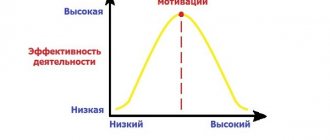Herzberg's theory is known as the motivation-hygiene theory, or two-factor theory, and is one of the most popular concepts of motivation. The bottom line is that there are two types of factors that can be found in the workplace: some of them create conditions where employees receive job satisfaction, while others cause dissatisfaction and reduce the morale and desire of employees to work. This explains why employees leave their previous jobs. Managers need to understand what motivates their employees because they are not just looking for a good salary.
Motivating factors
Frederick Herzberg's theory of motivation associates the first group of factors with the process of satisfaction.
In general, he is guided by such things as relate to the inner essence of the work. Among them are the work itself, as well as some needs. For example, the need for recognition, trust, professional perspective, etc. The nature of all these things has a motivating effect. Therefore, Herzberg's theory of motivation defines them as motivating factors. They directly affect efficiency and labor productivity. In other words, these factors in relation to work are internal, meaningful. Herzberg's theory of motivation generally distinguishes between external and internal influence.
Summary
Between Frederick Herzberg's two-factor theory of motivation, certain parallels can be drawn with Abraham Maslow's pyramid of needs: the hygiene needs of Herzberg's theory correspond to the lowest level of needs of Maslow's pyramid, and motivating factors correspond to the highest level of needs, respectively.
Herzberg's two-factor theory of motivation was a new explanation of the mechanism of people's motivation in the process of work. Previously, to increase staff motivation, attempts were made to improve working conditions, increase wages, provide special benefits, in other words, attention was paid to hygiene factors. But these attempts and solutions did not give the necessary results, because... They had no effect on employee motivation. Subsequently, many organizations attempted to implement the basic provisions of Herzberg's theory, and in fact they showed their effectiveness.
However, despite the effective application of Herzberg's theory in practice by many organizations, several criticisms have been leveled at the theory:
- The source of motivation can be both motivating and hygiene factors, which depends on the needs of each individual person;
- A lack of motivators can lead to a state of dissatisfaction with the activity, and successfully formed hygiene factors can lead to a state of satisfaction, which depends on each specific situation;
- Not in all cases, a state of satisfaction with activities leads to an increase in labor productivity, which significantly diverges from Herzberg’s assumptions;
- A system for increasing motivation should be created taking into account all possible behavioral characteristics of people and characteristics of the environment.
All these remarks are evidence that motivation should be considered as a plausible process. What will motivate one person in a certain situation may not have any effect on him in another situation or on another person in a similar situation.
Thus, we can summarize: Frederick Herzberg, of course, made significant contributions to the understanding of human motivation, but in his theory he did not take into account many variables that determine situations related to motivation. Further research by scientists led to the creation of procedural theories of motivation.
We also recommend reading:
- Storytelling
- How to enjoy work
- Adams' Theory of Fairness to Employees
- Factors in a child’s intellectual development
- Business motivation model
- 10 factors of professional burnout
- Social technologies
- Cattell's personality model
- IQ: what is it and how is it measured?
- Internal and external motivation: which is more effective?
- Causes of aggression
Key words:1Psychoregulation
Herzberg's theory of motivation in practice
If an employee is dissatisfied with his job, he is unlikely to strive for something more. Most likely, he will automatically perform the tasks assigned to him, without even trying to learn new things. The manager can correct the situation by mastering the application of Herzberg's theory in practice. It is enough to use simple tips:
- Review company policy. Remove or correct what is in the way.
- Ensure control of all processes. Only it should be unobtrusive, but at the same time effective.
- Create and maintain a friendly atmosphere in the team. Introduce a culture of respect for everyone who is part of the team.
- Make wages competitive. Let it be slightly higher than the average in the labor market.
- Take care of safety in the workplace.
The listed actions will help eliminate employee dissatisfaction. But this is not enough. They should enjoy their work. How to achieve this?
- Set ambitious goals for the team. Only they must be achievable. Otherwise, the person will quickly get tired and quit the game.
- Show how valuable the employee is to the company, talk about his achievements.
- Give interesting tasks.
- Give each employee more responsibility.
- Provide an opportunity to move up the career ladder.
- Provide opportunities to learn and improve skills.
A leader must find an individual approach to each person, no matter how banal it may sound. What is motivation for one person is a demotivator for another.
Application of Herzberg's theory
In order to achieve motivation, the manager must ensure the presence of not only hygiene, but also motivating factors. Many organizations have attempted to implement these theoretical insights through job enrichment programs. During the implementation of the labor “enrichment” program, the work is restructured and expanded so as to bring more satisfaction and rewards to its immediate performer. “Enrichment” of work is aimed at structuring work activity in such a way as to make the performer feel the complexity and significance of the task entrusted to him, independence in choosing decisions, the absence of monotony and routine operations, responsibility for the given task, the feeling that the person is performing separate and completely independent work . Among the several hundred firms that use job enrichment programs to eliminate the negative effects of fatigue and the associated decline in productivity are Texas Instruments. Although the concept of work enrichment has been used very successfully in many situations, it is not suitable for motivating all people.
In order to use Herzberg's theory effectively, it is necessary to create a list of hygiene and, especially, motivating factors and give employees the opportunity to determine and indicate what they prefer.
The same factor can cause job satisfaction in one person and dissatisfaction in another, and vice versa. Thus, both hygiene and motivating factors can be a source of motivation, and this depends on the needs of specific people. Since different people have different needs, different factors will motivate different people.
For example, a person may love his job because he considers his colleagues to be friends and, by communicating with them, he satisfies his social needs. However, such a person may consider chatting with colleagues to be more important than doing the work assigned to him. Thus, although job satisfaction is high, productivity may be low.
Due to the fact that social needs play a very important role, the introduction of such motivating factors as increasing responsibility for the assigned task may not have a motivating effect and will not lead to increased productivity. This will be exactly the case, especially if other workers perceive the increase in the worker’s productivity as a violation of unspoken production standards.
Read also:
Theories of motivation – To date, many theories on motivation have been put forward, which are divided into procedural and substantive.
History of motivational management – The evolutionary development of motivational management begins before our era.
The theory of two factors by F. Herzberg - F. Herzberg identified two groups of factors influencing the motivation of work - these are hygienic and motivating.
Original and modern theories of motivation - The very first technique used was the carrot and stick method. It was simply taken for granted that people would be grateful for anything that would allow them and their families to survive. In conditions when most people were struggling to survive, it was quite understandable that a person would always try to improve his economic situation when given the opportunity.
A. Maslow's theory of needs - Abraham Maslow recognized that people have many different needs, but also believed that these needs can be divided into five main categories.
Criticism of Herzberg's theory
The first weak point of this theory is the subjectivity of the responses of the recipients of the research. There is a tendency when people associate the feeling of satisfaction from the work done with themselves and their personal qualities. And negative emotions - disappointment, etc., which causes dissatisfaction - with uncontrollable influence from the outside. Therefore, it is not always possible to establish a clear correlation between hygiene and motivating factors, on the one hand, and the state of satisfaction/dissatisfaction, on the other.
Herzberg's theory of motivation was tested in some enterprises and in some cases gave positive results. However, not all scientists agree with Dr. Herzberg's findings.
Also, not everyone agrees with him that material reward for work is not among the motivating factors. This is especially true for countries with lagging economic development and low living standards. Other factors that Herzberg deprives of the status of motivators may well be such - this is determined by the requests and needs of each specific employee, and not by a general pattern.
Among other things, it is not always possible to establish a connection between the level of job satisfaction and labor productivity. A person is a complex psychological phenomenon, and it may happen that other factors, such as communication with colleagues or access to certain information, will provide an employee with high job satisfaction. In this case, labor productivity and efficiency indicators will remain unchanged.
General provisions of the theory
So, how do Maslow’s theory of needs or McClelland’s already mentioned theory of motivation differ from Herzberg’s theory? Here are the main provisions of Herzberg's model:
- It is postulated that there is a clear relationship between job satisfaction and labor indicators - efficiency, productivity, etc.
- The presence of hygiene factors is not perceived by employees as additional motivation. Their presence is not realized and is taken for granted. In general, these factors should ensure normal, acceptable working conditions.
- The presence of motivating factors does not compensate for the lack of hygiene needs or compensates them partially and temporarily.
- Therefore, to create the most productive work environment possible, you must first understand your hygiene needs. Once the problems with them have been resolved, and there are no factors left in the workspace that cause employee dissatisfaction, you can address the motivating factors. Such an integrated approach will provide the company with the highest possible efficiency, quality and volume of work performed.
- To achieve such a result, according to Herzberg’s theory, middle and especially senior managers must delve into the essence of the employees’ work and understand its essence from the inside. This will help identify their hygiene needs and possible motivating factors.
Motivating factors
These are more powerful forces that motivate an employee to devote time and energy to the benefit of a particular organization.
Here attention is focused on the activity itself, its essence. A person who does what he loves has a natural desire for professional growth and skill development
Motivating reasons also include:
- The desire for success and public recognition.
- Opportunity for career growth.
- Responsibility.
- The desire and ability to approach problem solving creatively.
The motivating component partly satisfies our ego
A person needs social recognition; it is important for him to gain a sense of self-esteem. Managers are recommended to reward employees with good feedback on the work done (if this is true)
According to the scientist, the absence of motivating reasons does not bring the employee a feeling of dissatisfaction (unlike hygienic reasons, the absence of which can provoke the employee to leave the company).
Hygiene factors
The concept of “hygiene” has firmly settled in the human consciousness and is closely related to maintaining the cleanliness of the body. This term comes from medicine. Herzberg's theory has no connection with soap and toothbrushes. “Hygiene” is translated from Latin as “warning.”
Hygiene factors are those that keep a person in a certain job and prevent his leaving. What can keep a person in a particular workplace, according to the results of a survey by a psychologist?
Corporate philosophy and company policy. Working conditions (environment, schedule, food, social package). The status given by the position held. Salary. Relationships within the team and with company management. Attention and control of employee actions.
If all of the above is met, the employee will continue to cooperate with the company. It will not cause a storm of positive emotions; these conditions are taken for granted. If they are not followed, the employee will have a desire to leave the organization.
For many, it is surprising that Frederick Herzberg’s hygienic motivation also included salary. Company managers often rely on increasing wages and improving working conditions, believing that these are the best motivational reasons. After some time, management sees that such motivation does not work: the salary increase caused an emotional outburst once, and a clean floor in the office and a new coffee maker are just a nice bonus, but not a motivator.
Herzberg's two-factor theory of motivation
Herzberg's two-factor theory was developed in 1959. Frederick Herzberg was interested in people's motivation and job satisfaction.
The essence of the theory. What is the basis?
Herzberg's two-factor theory emerged from a set of data collected from a survey of 203 accountants and engineers. The interview process consisted of respondents describing situations at work in which they felt happy and unhappy.
Analysis of the responses confirmed the proposed hypothesis, where some circumstances contributed to job satisfaction, while others did not. It has been noted that certain circumstances are a source of dissatisfaction in absence. Based on this, Herzberg developed a theory according to which people's satisfaction with work depends on 2 factors: motivating (satisfaction) and hygienic (dissatisfaction).
Hygiene factors
These factors describe the work environment and symbolize the physiological needs that people would like to satisfy. They include:
Salary that must be competitive with other organizations in the same industry. Company policies, which should be fair, clear and should include flexible hours, dress code, breaks, vacations, etc. Status. The organization must maintain the status of all workers. Fringe benefits. Workers should be provided with free health care, benefits for family members, worker assistance programs, etc.
e. Equipment and working environment must be safe, hygienic and fit for purpose. Friendly relations should be maintained both between superiors and subordinates, and within the team. It is important that employees feel that they are not under constant threat of dismissal.
Motivating factors
Herzberg's motivational factors bring positive satisfaction to employees. Having motivators makes employees work harder. They are located within the work itself. These factors are called satisficing factors. Motivators symbolize psychological needs that are perceived by workers as an additional benefit.
Motivational factors include:
- The work performed should guarantee the employee praise and recognition of his success. This recognition must come from both superiors and colleagues.
- Work should evoke a feeling of pride that a person has done something difficult and worthwhile.
- The organization should provide opportunities for growth and advancement to motivate employees to perform well.
- The work itself should be interesting, varied and contain enough challenges to motivate employees.
F. Herzberg's two-factor model of motivation
In the second half of the 50s
Frederick Herzberg developed a needs-based model of motivation. His two-factor model “hygiene - motivation” is one of the most popular among business managers. It does not enjoy the same love in the academic world as it does among practicing managers. F. Hertzberg is a professor of management and psychology at the University of Utah and one of the well-known consultants in the field of management.
Herzberg visited many countries in Europe, the Middle East, South America and Asia. Early in his career he wrote two books: Work Attitude: A Brief Review of Research and Opinion
and
Motivation to Work
, the second was co-written by Herzberg with Mosler and Snyderman.
The second book contains Herzberg's most important scientific research. In the Harvard Business Review
, the world's leading management journal, he published an article, “
How to Motivate Workers, Revisited
” (February
1968
).
This article is one of the most frequently reprinted in the management field. The book “ Managerial Choices: Being Effective and Being Human
” was written by him specifically for managers.
Frederick Herzberg is considered a leading behavioral theorist. He identified two groups of labor activity factors: the content of the work; working conditions
. Herzberg put forward the concept that only the content of work is a factor of motivation and causes satisfaction with work, working conditions are not motivators, they only cause dissatisfaction.
Herzberg took an original path. He asked about 200
engineers and office employees of a large paint company in Pittsburgh. His questionnaire did not have a long list of questions. The question he asked the office workers and engineers was this. He asked them to think, remember and describe in detail when in the past they felt particularly good or especially bad about their work and asked them to think of examples of such attitudes towards their work. This main question was the only one. A simple question, but what he discovered gave rise to a number of management theories.
He arrived at his model by interviewing office workers and engineers. Later, he interviewed workers standing at the assembly line of automobiles and those involved in the production of soap. He interviewed farmers and people involved in a variety of activities. He interviewed people living in different countries of the world. His question was: “What do you like and dislike most about your job?” And asked for a detailed answer. Analyzing the responses, he discovered that in those stories where people talked about “bad”, there was a set of similar statements. And in those where people talked about “good”, the statements were varied.
Herzberg discovered that people’s activities are influenced by two groups of factors, which he called hygienic.
and
motivating
.
He identified 10
factors of working conditions: company policy, technical supervision, relations with the manager, relations with colleagues, relations with subordinates, earnings, safety and job security, personal and family life, working conditions, status.
These factors correspond to Maslow's three lower needs. Maslow's highest needs correspond to 6
motivational factors: achievement, recognition, work, opportunity for creative growth, responsibility.
Unlike Maslow, Herzberg's 10
factors of working conditions are not motivations that determine human behavior.
Many respondents did not like the policy pursued by the organization: it does not protect people, and therefore they are not eager to go to work. Some companies required the wearing of uniforms that employees did not like, which made them feel irritated and displeased. Or parking spaces were provided to them far away, while the parking lot for management personnel was located directly opposite the entrance. The workers did not like this policy. They did not like some of the managers from the plant administration. They considered them not very smart and talked about the arrogance of some of their bosses.
| Hygiene factors | Motivation |
| Administration policy Control of superiors Relations with the manager Relations with colleagues Relations with subordinates Security and job security Personal and family life Working conditions Conditions of payment Job status | Achieving the goal Recognition of success Opportunity for promotion High degree of independence Interesting work Responsibility |
The supervision of a superior officer caused dissatisfaction. If you like your boss, you don’t think about it. If you don't like your boss, then you think about it. Control by a superior boss causes negative emotions. A good boss is what you expect. But if you have a bad boss, then it annoys you. Control by a superior is one of the reasons for dissatisfaction.
Working conditions were often assessed as poor. People didn't like it when it was dark and there was a lot of soot, when it was dirty. It was hot in summer and cold in winter. The employees did not like the color of the walls in the offices. People around him usually think that they really don't like him. It’s bad when an organization has an air conditioner, but it doesn’t work in the summer.
Working conditions are talked about poorly and are rarely good. If there is a cafeteria for workers, then there are usually complaints about poor preparation, insufficient menu variety, and dirt. You can make the dining room clean, then they will stop complaining about the dirt, they won’t care. If you give them good food, they don't think about it. They expect the food to be good and they don't care. They don't say they can't wait to come to work because they like the food. But when the food is bad, they start complaining.
People complain about interpersonal relationships. If I like a person, then I will work with this person. But some people find it difficult to work with people they don't like. He shouts, is smug, not friendly, he is only interested in himself. The person you work with might steal your ideas, and you won't like that either. If you work with someone you don't like, it doesn't make you want to go to work. There is another problem - we bring personal value systems into our work. And your value system may not be the same as mine. And we may not be able to work together. These are negative examples.
Another negative point when answering the questions was salary. Most people believe that they are underpaid. Money is a negative factor, not a positive one. Workers constantly complain that they are paid less than they should. Let’s imagine that the boss says that everyone’s salary will be increased by 15%.
I will feel good for a short time until I realize that everyone has received as much as I have.
But I consider myself better than others, and I should be paid more. Probably everyone thinks the same. They believe that they are better than others and should get more. Why do we get the same? My job is harder than my neighbor's, but he gets the same money. Or I get 3%
salary increase and find out that inflation is
10%
.
I'm losing 7%
and feeling terrible.
Now about the work status. You think your work has a good status. Suddenly you realize that others look down on you and think that you are not as important as you thought. When you get promoted, you find that those above you continue to treat you condescendingly.
The guarantee for the future is also negative. You heard that the company laid off a lot of people last month, and now you can't sleep peacefully without thinking about losing your job. This is an example of people lacking guarantees.
F. Herzberg discovered that things are possible at work that cause displeasure in a person. For example, stupid policies of the organization's management, bad bosses, working conditions that you don't like. This includes interpersonal relationships, and the fact that you get paid a little. And the fact that you have a low status, and you are worried about the possibility of losing your job. These are negative factors; Herzberg calls them hygiene factors. Hygiene factors surround you while you work, but none of them are actually your work.
When he asked people what they liked about their job over the past few years, he got completely different answers, and they gave a different set of distinctive qualities that are motivators. The first incentive is achievement. If you have a good, hard job and you do it well, you feel a great sense of satisfaction. You know you did a good job and achieved your goal. Achieving a goal is what people enjoy. When you ask them what they like about work, they say that they liked doing work last month because they were able to do it very well. It was an achievement and it was great. Achieving something is a distinctive quality that makes people happy at work.
What else makes a person feel great is recognition of his successes, abilities, recognition of his achievements. When you do hard work and do it well, you feel great because you completed it successfully. You also feel good if someone notices this success and tells you that you did a great job. When your boss pats you on the shoulder and tells you that you did a great job, it flatters your self.
" And if your peers or your subordinates say that what you did was great, and it was a difficult task, then people like it.
People also like their work to be challenging. People don't like doing a repetitive task day after day. If your work is not challenging, you will be bored, but the constant challenge will also exhaust you. You will have a headache. You will get an ulcer if your work constantly tests you. People like their work to test them from time to time. People like to be recognized for success. After successfully answering the challenge, we slow down, bask in the rays of success, in the rays of recognition. We don't like hard work. We like to relax from time to time, to work a little. Then work hard again and, having encountered other difficulties, successfully overcome them, and then relax again. People like a challenge, but they don't like it when it's constant. But they also don’t like to relax all the time. The robot or machine works evenly, day after day. But we are human, we work hard, we relax, then we are ready to work hard again.
People like increased responsibility. They talked about it in their stories. When they were promoted, their responsibility and authority increased. Many people like to receive a promotion as recognition of past achievements. But when they start a new job, it may happen that they cannot do it well and this torments them. Most of them find that they can do it well. Once they learn a new job, they are happy with the increased responsibility. Another example where people felt great was when they could talk about their growth at work.
Most of you have met teenagers who are 13 - 17 years old.
.
They pretend to know everything. They often make mistakes, but are sure that they are right and do not listen to their father’s advice, because in their eyes he does not shine with intelligence. They think that they already know everything there is to know, and that the older generation is not very smart. But watch them when they are 24 years old
, an amazing metamorphosis occurs.
They look at today's 17-
year-olds and say: “Was I really that green at their age?”
They feel good because they are ripe. Their father doesn't seem so stupid to them anymore. He seems to have a lot of experience and knowledge and has a lot to talk about. Now they are already 24
years old and they are no longer children, they think.
If you talk to such a person in 27
years old, he thinks back to being
24
and says he can't believe he was so immature. People like to see them grow and develop at work. After ten years in an organization, some people are lucky if they can look back and say, “I learned so much! What a good development I received. I can do this job better than before. Now I perceive our organization more broadly.” Growth and development for most workers is an important differentiator.
Herzberg studied the results of the survey and determined that motivation “turns on” people and makes them interested in work. “Note,” he said, “that achieving success, recognition and testing are all part of the job. The fact that they do the work and develop is due to the fact that the work allows them to do so. Increased responsibilities and promotions are due to their good performance.”
Motivators have to do with the work you do. The negative aspects have to do with what surrounds your work. Good working conditions (hygienic factors) secure workers in the enterprise, but do not encourage them to increase labor productivity. Motivators relate to the content of work. They influence increased productivity and job satisfaction.
If you want to stimulate a worker, you cannot do it by providing him with better working conditions. You would stimulate him if you gave him a challenging job and the opportunity to succeed, which allows him to grow and develop. But they will complain about hygiene factors, about the boss controlling them, about working conditions. They will complain about not being paid enough and things like that. And this is what makes them feel unhappy. They don't complain about lack of motivation because they don't know it.
If you want a good worker, give him a job that has substance and allows him to grow, experience challenges, and succeed. Herzberg argued that it was necessary to take several works that leave people immature, combine them, expand them, not simply adding repetition of one movement after another, but putting some content into the work.
Many corporations in the USA
did it successfully. analyzed the work operations on her assembly line and asked the question: “How to give the worker more rights and increase his share of responsibility?” In many Japanese and American companies, any worker working on an assembly line who sees something wrong has the right to stop it and fix the problem. Herzberg believed that workplace reorganization and improved leadership styles were needed. And the employee needs to be given more freedom.
Herzberg's research into the factors that cause satisfaction or dissatisfaction proved that the process of gaining satisfaction and the process of increasing dissatisfaction are two different processes. This is confirmed by the fact that the factors that caused an increase in dissatisfaction, when eliminated, did not necessarily lead to an increase in satisfaction, and vice versa.
If they complain about the food, make the food better. If they complain about dirt, clean it up. If they complain that they have no status, try to get them status. But if you want to stimulate them, that's on a different continuum. You may have a worker who doesn't complain, but he is unmotivated. You may have a motivated worker but still have hygiene complaints. Satisfaction is a function of the content of the work, and dissatisfaction is a function of working conditions. Hygienic factors are collective operating conditions common to employees of an enterprise; motivating factors concern each employee individually. The "carrot and stick" method can get the job done, but the effect of this method is short-lived.
If workers' channels for satisfying higher needs are blocked, then money becomes the only object of desire and goal of activity. Under these conditions, workers will demand more and more remuneration, since rising wages will compensate for their inability to satisfy other needs. At the same time, orders, threats, and control are useless in motivating people focused on social and spiritual values.
Herzberg's ideas formed the basis of the "labor enrichment" program, which was successfully used by a number of leading US
. The development of this program presupposed the fulfillment of a number of conditions necessary for the successful activities of employees:
· know the results of your activities and their evaluation;
· have the opportunity for psychological growth;
· create your own work schedule;
· bear a certain share of financial responsibility;
· have the opportunity to communicate with managers at all levels of management;
· be accountable for your activities.
The motivation system should provide each participant with the opportunity to choose methods of reward in accordance with his individual scale of values. At the same time, classic material incentives in the form of wages and incentive payments narrow their effect, giving way to the expectation of reward from the work itself and its results.
The fact that money was classified as a hygiene factor rather than a motivator was unexpected. Obviously, during the survey, money was understood as a permanent salary of an employee, independent of output and quality of work. Money is important both for its purchasing power and status, but money should not be perceived as a universal solution to satisfy all needs. Therefore, they distinguish between material, labor and status systems of motivation. A clear manifestation of the contradiction is the lack of a positive connection between job satisfaction and labor productivity of an individual employee. Research has shown that there is no guarantee that dissatisfied employees perform worse than satisfied ones.
To use Herzberg's theory in practice, it is necessary to construct two profiles using sociological survey methods - working conditions and the content of the work itself in individual areas of the enterprise. After processing the survey data and analyzing it, you can see “weaknesses” and develop measures to eliminate them.
Let's compare Maslow's hierarchy of needs and Herzberg's two-factor model. The hygiene part corresponds to the lower levels of Maslow's hierarchy of needs, that is, physiological, safety and social needs. But there is no motivational content. When you stimulate a worker through respect and self-realization, then that worker grows.
The main significance of Herzberg's theory is that managers did not emphasize hygiene factors as the main ones in satisfying needs if lower-level needs were already satisfied. Motivators are used after hygiene needs have been met. This is a guarantee of employee maturation.
Balance of hygiene and motivating factors
According to the two-factor theory, the above factors of satisfaction and dissatisfaction operate independently of each other, and the absence of one does not lead to the presence of the other. Motivational and hygiene factors together can form a useful matrix for assessing employee motivation and, as a result, success for the firm. Below is a selection of these possible combinations:
- High motivation and hygiene. Optimal working conditions; employees are extremely interested in performing their job duties.
- High motivation and low hygiene. In this situation, workers are highly motivated, but they have many grievances. A typical example of this situation is that the job is interesting, but the pay and working conditions lag behind competitors in the same industry.
- Low motivation and high hygiene. In this situation, workers have few complaints, but they are poorly motivated. An example of such a situation is that the pay and working conditions are competitive, but the work is not interesting.
- Low motivation and low hygiene. Worst case scenario; employees are not interested in doing work and have a lot of grievances.
Herzberg's conclusions
In short, Herzberg's theory implies on the one hand that employees may be dissatisfied with their jobs. This is often related to hygiene factors such as wages and working conditions. On the other hand, employee satisfaction is related to motivation. Motivational factors relate to development opportunities, responsibility and evaluation. Focusing on motivators can improve the quality of work.











